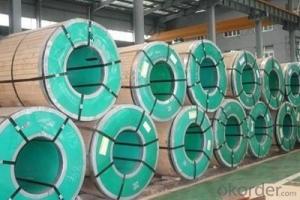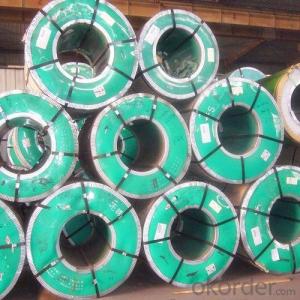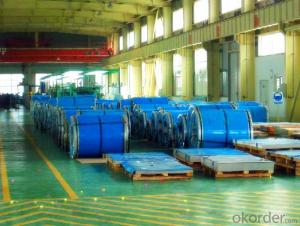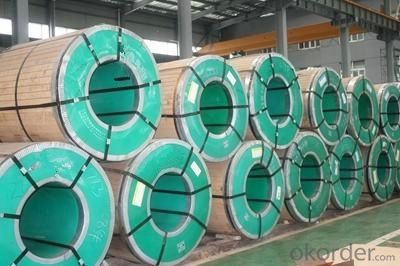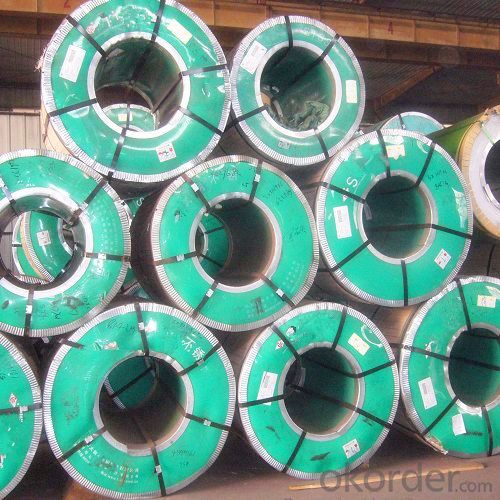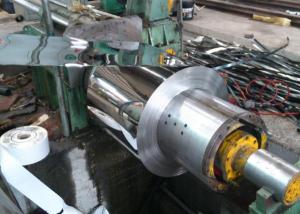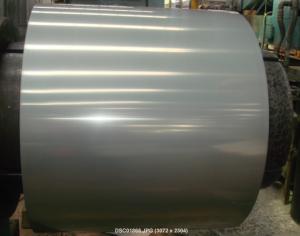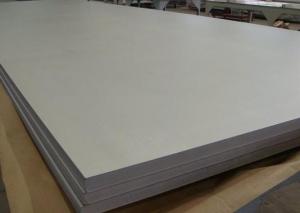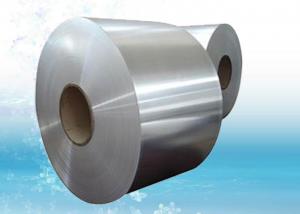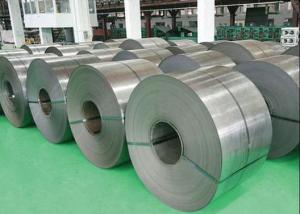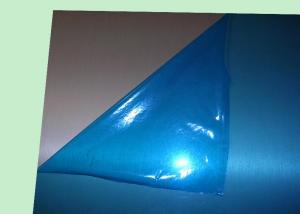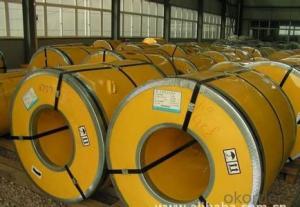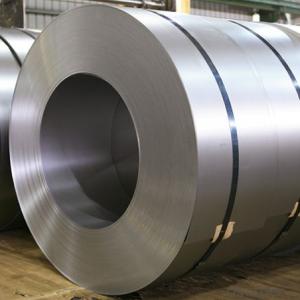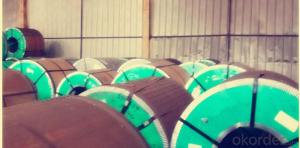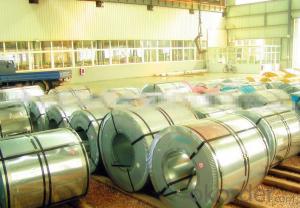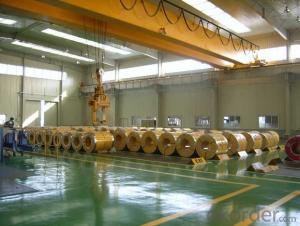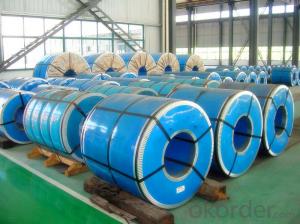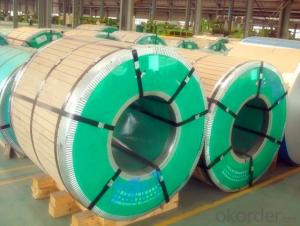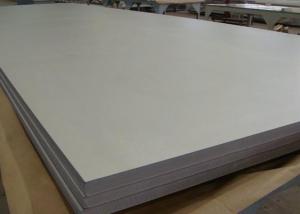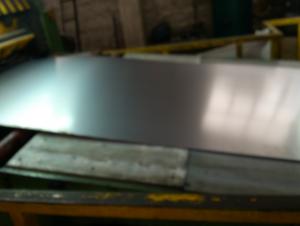Stainless Steel Coil 304 Hot Rolled Wide & Narrow No.1 Finish
- Loading Port:
- Guangzhou
- Payment Terms:
- TT OR LC
- Min Order Qty:
- 100 m.t.
- Supply Capability:
- 8000 m.t./month
OKorder Service Pledge
OKorder Financial Service
You Might Also Like
Grade: | 300 Series | Standard: | JIS,AISI,ASTM,GB,DIN,EN etc | Thickness: | 2.5mm, 3.0mm, 4.0mm |
Width: | 550mm-1500mm | Length: | according to weight | Place of Origin: | China (Mainland) |
Brand Name: | CNBM | Model Number: | 304 | Technique: | Hot Rolled |
Application: | industry, construction, furniture, repairing | Certification: | MTC | Finishing: | NO.1 |
Market: | globle area | Packaged: | wooden and bags in cases as standard | Payment: | TT & LC |
Delivery time: | 15 days | MOQ: | 100 tons | Advantage: | prime quality, competitive price |
Profession: | hot rolled | Charactor: | stainless steel coils | Material/Grade: | 304 |
Hot Rolled Stainless Steel Coil 304 Annealing and Pickling No.1 Finish
Stainless steel is a production which not easy rust,acid resistance and corrosion resistance,so it is widely
used in light industry,heavy industry,daily necessities and the decoration industry.
Hot Rolled Stainless Steel Coil 304 Specifications
1.surface:NO.1
2.standard:JIS, AISI, GB
3.width: 0.55m, 0.65m, 1.0m, 1.22m, 1.5m, 2m or requirement
Hot Rolled Stainless Steel Coil 304 Chemical Composition:
(%):C=0.07, Mn=2.00, P=0.045, S=0.030, Si=0.075, Cr=17.5-19.5, Ni=8.0-10.5, N=0.10
Hot Rolled Stainless Steel Coil 304 Physical Properties
Tensile strength σb (MPa) ≥ 520
the conditions yield strength σ0.2 (MPa) ≥ 205,
elongation δ5 (%) ≥ 40
Reduction of ψ (%) ≥ 50,
hardness: ≤ 187
HB; ≤ 90
HRB; ≤ 200H
- Q: Can stainless steel strips be used in solar panels?
- Solar panels can indeed utilize stainless steel strips. Due to its durability and resistance to corrosion, stainless steel is an excellent choice for a range of uses, including solar panels. It offers structural support and helps uphold the overall integrity of the solar panel assembly. In solar panel installations, stainless steel strips are frequently employed for framing and mounting purposes. They provide exceptional strength and stability, ensuring the panels remain firmly in position, even when faced with severe weather conditions. Furthermore, stainless steel's ability to resist corrosion makes it an ideal material for outdoor applications, as it can endure exposure to UV radiation, moisture, and other environmental elements commonly encountered in solar panel systems.
- Q: Can stainless steel strips be used in extreme temperature conditions?
- Yes, stainless steel strips can be used in extreme temperature conditions. Stainless steel is known for its high temperature resistance, making it suitable for use in both high and low temperature environments. It can withstand extreme heat without losing its strength or becoming deformed, making it a reliable choice for various applications in extreme temperature conditions.
- Q: What are the common uses of stainless steel strips in the pharmaceutical manufacturing process?
- Stainless steel strips play a crucial role in the pharmaceutical manufacturing process due to their unique properties and characteristics. Here are some common uses of stainless steel strips in pharmaceutical manufacturing: 1. Equipment fabrication: Stainless steel strips are extensively used for fabricating various pharmaceutical equipment such as mixing tanks, storage tanks, reactors, and piping systems. The corrosion resistance and hygienic properties of stainless steel make it ideal for maintaining a sterile environment and preventing contamination during the manufacturing process. 2. Pharmaceutical packaging: Stainless steel strips are commonly used for manufacturing pharmaceutical packaging materials such as vials, ampoules, and syringes. The high strength and durability of stainless steel strips ensure the protection and integrity of pharmaceutical products, especially those that are sensitive to external factors like moisture and temperature. 3. Cleanroom construction: Stainless steel strips are utilized in the construction of cleanrooms, which are critical for pharmaceutical manufacturing. These strips are used for creating partition walls, flooring, and ceilings, providing a sterile and controlled environment for the production of pharmaceutical products. 4. Conveyors and material handling systems: Stainless steel strips are employed in the construction of conveyors and material handling systems used in pharmaceutical manufacturing. These strips provide the necessary strength and resistance to chemicals and wear, ensuring the smooth and efficient movement of materials throughout the production process. 5. Filtration systems: Stainless steel strips are used in the fabrication of filtration systems, such as filter housings and filter cartridges. The anti-corrosive properties of stainless steel enable these filtration systems to effectively remove impurities, contaminants, and particles from pharmaceutical fluids and solutions. 6. Heat exchangers: Stainless steel strips are utilized in the construction of heat exchangers, which are vital for various pharmaceutical processes like sterilization, cooling, and heating. The excellent thermal conductivity of stainless steel enables efficient heat transfer, ensuring the precise control of temperature during the manufacturing process. Overall, stainless steel strips are indispensable in the pharmaceutical manufacturing process due to their corrosion resistance, durability, cleanliness, and ability to maintain a sterile environment. Their applications range from equipment fabrication to packaging, cleanroom construction, filtration, material handling, and heat exchange, playing a vital role in ensuring the quality and safety of pharmaceutical products.
- Q: Are stainless steel strips suitable for marine applications?
- Yes, stainless steel strips are highly suitable for marine applications. Stainless steel is known for its exceptional corrosion resistance, which makes it a preferred material for marine environments where exposure to saltwater, humidity, and other corrosive elements is common. Stainless steel strips have excellent strength and durability, allowing them to withstand harsh conditions, high temperatures, and mechanical stress commonly encountered in marine applications. Additionally, stainless steel's low maintenance requirements and aesthetic appeal make it a popular choice for various marine components such as boat fittings, marine hardware, marine fasteners, and shipbuilding.
- Q: Are 111 stainless steel strips suitable for chemical pipelines?
- Chemical pipelines should not use stainless steel strips with the grade 111 as they are unsuitable. The grade 111 is not recognized in standard stainless steel grading systems like AISI or ASTM. To ensure safety and reliability, it is crucial to opt for stainless steel grades designed specifically for chemical pipelines, such as 304 or 316L. These grades have exceptional corrosion resistance and are extensively utilized in diverse chemical and petrochemical industries. Employing stainless steel strips with an unidentified or non-standard grade may lead to corrosion, leaks, and pipeline system failures, thereby posing significant risks and safety hazards.
- Q: What are the common applications for stainless steel strips?
- Stainless steel strips have various common applications across different industries. Some of the common uses include automotive components, construction materials, kitchen appliances, electrical enclosures, and decorative trim. They are also utilized in the manufacturing of medical instruments, equipment for food processing, and aerospace components. The corrosion resistance, durability, and aesthetic appeal of stainless steel make it a versatile material for a wide range of applications.
- Q: Are stainless steel strips suitable for laser cutting?
- Yes, stainless steel strips are suitable for laser cutting. Laser cutting is a highly precise and efficient method of cutting various materials, including stainless steel. The high energy density of the laser beam allows for a clean and accurate cut, without causing any distortion or damage to the metal. Stainless steel, known for its corrosion resistance and durability, is a popular material choice for many industries, including automotive, aerospace, and construction. Laser cutting offers several advantages for stainless steel strips, such as reducing material waste, maintaining tight tolerances, and enabling intricate designs. Additionally, laser cutting provides a smooth and burr-free edge finish, enhancing the aesthetic appeal of the stainless steel strips.
- Q: Can stainless steel strips be used in the production of automotive parts?
- Yes, stainless steel strips can be used in the production of automotive parts. Stainless steel is a durable and corrosion-resistant material, making it suitable for various automotive applications such as exhaust systems, trim parts, brackets, and other components. Its strength, resistance to heat and chemicals, and aesthetic appeal make it a preferred choice in the automotive industry.
- Q: Are stainless steel strips available in different finishes?
- Yes, stainless steel strips are available in different finishes. Stainless steel is a versatile material that can be finished in various ways to achieve different appearances and properties. Some common finishes for stainless steel strips include brushed, polished, satin, mirror, and matte finishes. These finishes can vary in terms of texture, shine, and reflectivity, allowing for a wide range of aesthetic options. Additionally, different finishes can also affect the corrosion resistance, durability, and cleanability of stainless steel strips, making them suitable for various applications and environments.
- Q: Can stainless steel strips be soldered?
- Soldering stainless steel strips can be accomplished, but it necessitates specific methods and materials. Due to its high melting point and low thermal conductivity, conventional soldering techniques may not yield satisfactory results. Nevertheless, it is achievable to solder stainless steel by utilizing dedicated fluxes and solders that are specially designed for this purpose. These products are typically composed of nickel or silver alloys, which have a lower melting point compared to stainless steel. Moreover, the stainless steel surface might need to undergo preparation through abrasives or chemical treatments to enhance adhesion. In summary, soldering stainless steel necessitates the use of specialized equipment and materials, but it is certainly feasible when employing the appropriate techniques and products.
Send your message to us
Stainless Steel Coil 304 Hot Rolled Wide & Narrow No.1 Finish
- Loading Port:
- Guangzhou
- Payment Terms:
- TT OR LC
- Min Order Qty:
- 100 m.t.
- Supply Capability:
- 8000 m.t./month
OKorder Service Pledge
OKorder Financial Service
Similar products
Hot products
Hot Searches
Related keywords
